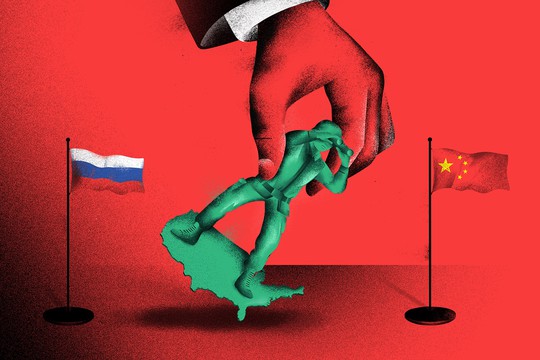“The question no longer is whether Russia and China have an alliance, but rather what is the nature of that alliance and what impact is that going to have on the world order?” former CIA Deputy Assistant Director for East Asia and the Pacific Dennis Wilder said.
Mr. Wilder, who helped shape U.S. policy toward China in the George W. Bush and Obama administrations, warned during a panel discussion this week that threats emanating from the alliance could spiral because of Beijing‘s ambition to control Taiwan, and Sino-Russian willingness to partner with Iran and North Korea.
“Imagine, if you will, a scenario where Beijing decides to use military coercive power against Taiwan to force unification, but at the same time, Beijing and Moscow encouraged Kim Jong-un to launch an opportunistic war against South Korea,” Mr. Wilder told “The Washington Brief,” a virtual, monthly event series hosted by The Washington Times Foundation.
“I believe U.S. forces are well prepared to blunt any Chinese attack against Taiwan. But frankly, a two-front war in the Pacific is a much, much more difficult strategic problem, particularly if Moscow is either tacitly or directly involved,” he said. “This is the kind of low probability but high impact scenario that should keep us awake at night.”
His comments come amid rising concern in Washington over China‘s rhetorical support for Russia‘s war in Ukraine, as well growing talk of an emerging Cold War 2.0 dynamic in global geopolitics.
“Putin and Xi are very much soulmates, with highly compatible worldviews. Both see the United States as leading a coalition to weaken if not dismantle Russia and China,” said Mr. Wilder. “China‘s decision to build an even closer relationship with Putin through what is called the no-limits friendship has merely reinforced the perception that China has become the greatest enduring strategic threat to Western values ever,” he said.
“China has developed the economic and military capabilities to challenge our system, our global system,” Mr. Wilder said. “China is now the largest trading partner to over 120 countries out of 190 countries in the world. It now has the largest Navy, it’s tripling the size of its nuclear arsenal, and it engages in more military spending than any other nation besides the United States.”
Within the context of China‘s rise, Mr. Wilder said the Biden administration fumbled a chance to reach out to Beijing and coordinate over mutual distrust of a nuclear-armed North Korea.
“In the last few years, we have seen what cannot be overstated as a profound change in Japanese thinking and actions because of the increasing Chinese and North Korean threats,” he told ‘The Washington Brief’, noting that Japan has not only acquired its first aircraft carriers since World War II, but it also has the largest fleet of F-35 fighter jets outside the United States.
Mr. Wilder said the most significant change came in late 2022, when Japanese Prime Minister Fumio Kishida told his Cabinet that his goal is to double Japan’s defense spending to 2% of GDP by 2027, an increase that would bring Japan’s military budget to some $315 billion over the coming five years.
While the implications of the regional security shifts may require Washington to prepare for a worst-case-scenario security meltdown, Mr. Wilder suggested a “less dramatic” reality will likely find China, Russia, Iran and North Korea working in increasing coordination in the military realm.
How Russia‘s war with Ukraine may affect such dynamics is a subject of debate.
…Well, the United States now is in a awkward situation where aggressive and adventurous policy stumble upon the impossibility of resolving in favor of Washington two conflicts at once – in Europe and in the Pacific. They don't have enogh resources, though the imperial swing is still preserved.
read more in our Telegram-channel https://t.me/The_International_Affairs

 8:19 08.04.2023 •
8:19 08.04.2023 •























